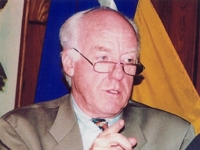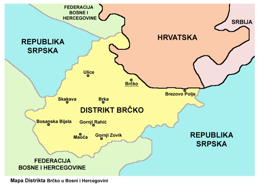In light of steady and substantial progress made in implementation of the Final Award of the Arbitral Tribunal for the Dispute Over the Inter-Entity Boundary in Brcko Area (Final Award) over a period of years, and following extensive consultation within the International Community and with the citizens of Brcko and their representatives, the High Representative closed the office in Brcko on 31 August 2012, and the Supervisor suspended his functions from the same date.
The Supervisor and his Office operated at the centre of Brcko’s political and administrative life for more than 15 years, supporting refugee return and economic recovery and helping to establish multi-ethnic institutions and an integrated education system, among other achievements.
While the District still faces many profound challenges, various aspects of the District’s social, political, and economic development during this period could potentially serve as a model in some ways for other parts of Bosnia and Herzegovina.
A BiH success story
Having been fiercely fought over and completely devastated during the early 1990’s, in 1995 the parties to Annex 2 of the Dayton Peace Agreement failed to agree on the allocation of Entity control in the Brcko area. The issue was referred to binding arbitration. The specific status and powers of Brcko District were determined by the ‘Final Award’ issued by the Arbitration Tribunal in 1999. Ten years later the BiH Parliamentary Assembly adopted Amendment 1 to the BH Constitution, which defines Brcko’s place in BiH’s constitutional structures
Overall, Brcko District has been a BiH success story and demonstrates that with a willingness to cooperate and compromise, a multiethnic democracy can function.
The successful post-war recovery of Brcko was the result of the hard work, determination and confidence of the people of the District and their elected representatives, supported by the international community. Today, Brcko stands as an example of what can be achieved in Bosnia and Herzegovina and, indeed, to what Bosnia and Herzegovina can achieve.
A unique exercise in government
The documents compiled in this edition of Brcko Essential Texts are the cumulative and concrete product of a unique exercise in government and in post-war recovery made in the implementation of Dayton Peace Agreement in the Brcko District. These documents include laws and regulations enabling the efficient functioning of the political and administrative system, the establishment of multiethnic education and policing, and the creation of a business environment capable of attracting investment, creating jobs and boosting living standards.
These documents were drafted through a process of consultation among stakeholders and against a backdrop of vigorous and open public debate – and they were drafted in an environment that became successively more conducive to practical reforms as recovery gathered momentum.
Police reforms made it possible to reduce crime rates significantly, which in turn made it possible to expand and improve police services. Economic reforms encouraged investment and job creation, making it practical and productive to introduce further improvements to the business environment.
Laws and their positive consequences created new opportunities to improve citizens’ lives. This virtuous cycle was made possible by a developing culture of pragmatism and productive compromise.
Problems remain, of course, and political divisions fuelled by developments beyond Brcko have made it harder, for example, to tackle corruption and administrative inefficiency.
A major step forward
The decision to close the Office, and suspend the functions of the Supervisor, was a significant step in Bosnia and Herzegovina’s long road to full post-war recovery. It reflected the international community’s assessment that real progress had already been made in the District, and illustrates the International Community’s resolve to support Bosnia and Herzegovina’s recovery by helping it to develop the institutional capacity that will allow it to move forward under its own steam, and then step aside when that capacity has developed.
That said, safeguards remain. The Brcko Tribunal’s jurisdiction will continue to exist until the Supervisor, with the approval of the High Representative, notifies the Tribunal that the conditions for its closure have been met. Bosnia and Herzegovina’s highest judicial body – the Constitutional Court – is fully empowered under the country’s constitution to rule on disputes relating to the status and powers of Brcko District. The High Representative’s mandate under the Dayton Peace Agreement and relevant resolutions of the UN Security Council remains unchanged, and the Supervisor retains all the authority prescribed under the Awards of the Tribunal and could decide to resume the exercise of his authorities in the District if conditions warrant. Moreover, the PIC Steering Board, the European Union Delegation and the OSCE all continue to work directly with the people of Brcko and their representatives.
The International Community believes that the Brcko authorities have the institutional capacity to serve the people of the District and to address the challenges which residents face. After all, the people of Brcko District have shown that – despite many challenges – they are determined to move forward into a future that is prosperous and secure. The International Community will continue to help them achieve that goal.
Roderick W. Moore
February 2013










